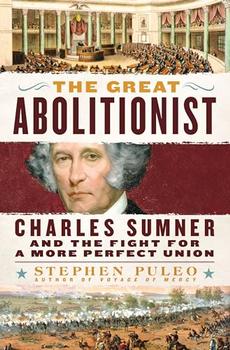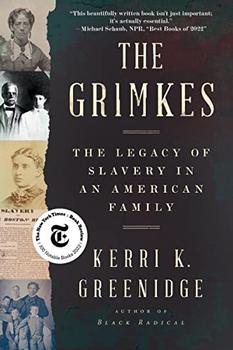Summary | Excerpt | Reviews | Beyond the book | Read-Alikes | Genres & Themes | Author Bio

Charles Sumner and the Fight for a More Perfect Union
by Stephen PuleoA decade before Confederate troops fired upon Fort Sumter in Charleston Harbor, initiating the Civil War, Charles Sumner entered the United States Senate. A political career had never been an ambition for the Massachusetts lawyer; Sumner was simply consumed with the eradication of slavery. In his biography The Great Abolitionist: Charles Sumner and the Fight for a More Perfect Union, historian Stephen Puleo explains the adoration Sumner had for the Constitution. The word "slavery" never appeared once in the document.
However, Sumner's view was the minority opinion. Popular Massachusetts senator Daniel Webster, who eventually became Secretary of State, leaving his seat up for grabs — Sumner won it by two votes — didn't agree with Sumner about slavery. Webster once said the North was wrong and the South was right.
Webster supported the Compromise of 1850 and Sumner never forgave him. While the Compromise established California as a free state, it also allowed for a harsher Fugitive Slave Law to be adopted. The law would force Northern jurisdictions to arrest runaway slaves on the spot. There would be no jury to weigh evidence and the slave could not be questioned about the circumstances of fleeing bondage. There were no appeals. A $1,000 fine and six months in jail were to be levied against anyone who assisted a person fleeing enslavement.
To Sumner, the Compromise was treasonous. He was insulted and horrified that human beings were commodified, sold, mistreated, and abused. "I am quite alone," he wrote to a friend about his isolation. Most in Massachusetts agreed with Webster. They may have thought slavery had its horrors, but the majority believed it wasn't up to Northerners to decide on its legitimacy.
At the age of 39, Sumner had lost four siblings and a father. His 22-year-old sister Mary had died from tuberculosis when he was 33. "No other death," Puleo writes, "before or after affected Sumner so deeply, and thoughts of Mary stayed with him always." It was Mary's death that sharpened his anti-slavery passions.
Sumner had also never forgotten what had happened years earlier in Washington D.C. at the National Mall. He observed Upper South slaves post-sale, in chains, being marched to Deep South cotton states. He couldn't get out of his brain how inhumane and cruel slavery was. The images shaped his adult life. While he struggled in personal relationships — Puleo describes him as socially awkward — he fought tooth and nail for slavery's demise.
The Free Soil Party, whose motto was "Free Soil, Free Speech, Free Labor, and Free Men," recruited Sumner to the Senate to take Webster's seat. Like Sumner, the Free Soilers disdained Daniel Webster. At their convention in October of 1850 they called him a "Traitor to Liberty," "Benedict Arnold," and "Lucifer fallen." A month later Charles Sumner addressed an audience at Faneuil Hall in support of the party and, as Puleo describes it, the position that "Any slave-hunter should be treated as a pariah and an outcast, and the public should know of his crimes." Sumner called for slavery to be abolished within the sphere of the national government. He also called for the elimination of the domestic slave trade, in which slaves from one state were sold to another. Many in Massachusetts couldn't stomach Sumner nor the Free Soilers. Local newspapers called Sumner a traitor for his rebuke of Webster. "Democrats asked for assurances from Sumner that he would not 'agitate' the slavery question in the Senate, which he steadfastly refused to provide," writes Puleo.
The tide turned when Thomas Sims, who had escaped enslavement, was captured by Boston police at the behest of a slave hunter named John Bacon. Sims remained in custody until his case was adjudicated. Abolitionists like Sumner were outraged that he was returned to slavery but the enhanced Fugitive Slave Law left them impotent. The abolitionist movement in Massachusetts suddenly had allies when it was reported that upon Sims' return to Savannah he was beaten in the public square for his escape. Thirty-nine lashes across his bare back and three months in prison. Many were disgusted at the role Boston played in his return.
After Sumner barely won the Senate seat vacated by Webster, he wrote in a letter to friend Henry Wadsworth Longfellow, "The great hours of history seem to be tolling now." And after Lincoln was elected in 1860: "There must be no yielding on our part. We are on the eve of great events."
It is debatable what makes a good politician, a good senator. Despite being an eloquent writer, Charles Sumner didn't craft any legislation. What separated him from his colleagues was his moral compass, the willingness to fight for African American equality despite the cost, despite being despised by both Southerners and Northerners.
Stephen Puleo's biography of Sumner has a lot of educational passages, as it tutors its readers in the Cotton Whigs, the Conscience Whigs, the Free Soilers, the Kansas-Nebraska Act. The abolitionist movement is granted a close-up examination often missed by history texts, enriching our understanding of the high emotions in pre-Civil War Northern communities.
What becomes clear as the chapters move from one Senate crisis to another is how influential Charles Sumner was simply by leading with virtue and discipline. He impacted writers such as Nathaniel Hawthorne, Ralph Waldo Emerson, and Henry David Thoreau. He impressed John P. Jewett, who published Harriet Beecher Stowe's anti-slavery novel Uncle Tom's Cabin. Within a few days, it sold 5,000 copies, and 300,000 by year's end.
The cost to Sumner was death threats from Southerners who were anxious about their way of life being taken from them. Like most men of conscience, Sumner ignored the outside noise, providing a template for modern-day moral crusades. Fight on. Believe in moral law. Don't surrender.
There was something oddly familiar in Sumner that I recognized halfway through my reading of The Great Abolitionist. He reminded me of someone. Putting the book down, I reread Martin Luther King Jr.'s "The Negro Is Your Brother," which he wrote from Birmingham jail. There it was. The similarity. Particularly in one line: "I am in Birmingham because injustice is here."
Sumner was in the Senate because injustice was in the Southern and Northern states. King went on to say, "I cannot sit idly by."
Neither could Charles Sumner. His life story is a testimony to the good inside of men. His crusade against slavery was admirable, compassionate, and quite heroic. His character was exemplary.
![]() This review
first ran in the June 19, 2024
issue of BookBrowse Recommends.
This review
first ran in the June 19, 2024
issue of BookBrowse Recommends.

If you liked The Great Abolitionist, try these:

by Kellie Carter Jackson
Published 2025
A radical reframing of the past and present of Black resistance—both nonviolent and violent—to white supremacy.

by Kerri K. Greenidge
Published 2024
A stunning counternarrative of the legendary abolitionist Grimke sisters that finally reclaims the forgotten Black members of their family.
Your guide toexceptional books
BookBrowse seeks out and recommends the best in contemporary fiction and nonfiction—books that not only engage and entertain but also deepen our understanding of ourselves and the world around us.